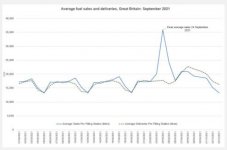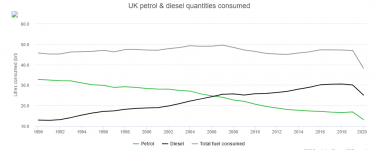bear66
Well-known member
I said they were really emptying the tanks.Our local station is now on its 4th day with no fuel. Last week they had 4 deliveries, this week not one.
I said they were really emptying the tanks.Our local station is now on its 4th day with no fuel. Last week they had 4 deliveries, this week not one.
Yeah, I agree with that bit, the standard of teaching is probably similar albeit I imagine the funding is less, although it's also probably cheaper, so that maybe cancels out/ evens up.To sum up Eastern Europeans under 50 are just as well educated as Brits (up to Level 3 - A level). The reason they came to the UK was better opportunities in the period 1997 - 2012 ish, not because they are poorly educated, But that has now changed as opportunities are similar or soon becoming similar in their own country.
Can we all please agree?
Is that just BP?Forecourt fuel stocks had fallen to 32% on 23 September prior to BP announcing the shortage.
View attachment 25689
No. All petrol stations. It shows that there was a gradual decline in stocks from Freedom Day. Panic buying wasn't the issue; it just moves the decline by about a week. At 13% there was a little over a day's stock countrywide average.Is that just BP?
So 40% full is all fuel stations open, and to not have gone to zero meaning that 20% still had fuel or there was 20% split over the UK (unevenly).
I wonder if those who didn't have massive demand, still put in orders so fuel was going to places where it wasn't necessarily needed back then? Looks like it's on the way back up, but hopefully not a bounce.

Yeah, would have been good to see that graph over a longer timeframe, like a decade. Hard to know where we are, if we don't know where we were pre pandemic, pred brexit etc.No. All petrol stations. It shows that there was a gradual decline in stocks from Freedom Day. Panic buying wasn't the issue; it just moves the decline by about a week. At 13% there was a little over a day's stock countrywide average.
The supply / demand graph :
View attachment 25691
45% is 'standard' pre-pandemicYeah, would have been good to see that graph over a longer timeframe, like a decade. Hard to know where we are, if we don't know where we were pre pandemic, pred brexit etc.
That makes sense, but was diesel changed at the same time as diesel deliveries also fell at the same time?The Government’s switch to greener petrol last month was a “major factor” behind the fuel crisis that saw forecourts across the country run dry, industry chiefs have revealed.
Retailers said they had already been “emptying their tanks as fast as we could” for the switchover to E10 petrol when a sudden surge in panic buying quickly drained their remaining stocks.
According to official figures released on Thursday, fuel deliveries to petrol stations remained steady over the summer and throughout most of September despite warnings of a slowdown caused by a shortage of HGV drivers.
Yet the amount of spare fuel stored at forecourts fell sharply by up to a quarter after Sept 1, when the Government introduced greener E10 fuel as the standard unleaded petrol.
When motorists began panic buying on Sept 24, garages across the country found they did not have enough in their storage tanks to keep up with demand.
Advertisement
Brian Madderson, the chairman of the Petrol Retailers Association, said the data showed that the fuel crisis had been an “unintended consequence” of the Government’s switch to greener petrol.
“For weeks we had been emptying our tanks of E5, the old fuel, as fast as we could to get ready for E10. We had all run our petrol stocks down,” Mr Madderson said.
“So when the panic buying started, many of our members ran out pretty quickly. Then the shortage of HGV drivers meant we couldn’t get supplies quickly enough.
“I don’t blame the Government particularly but the E10 switchover clearly had an unintended consequence: we couldn’t cope with the surge in demand.”
From the telegraph.
I don't believe diesel is part of the new rules but I suppose it makes sense that those with diesel vehicles would panic buy aswell as those who own petrol vehicles if those folks don't know about the upcoming fuel change.That makes sense, but was diesel changed at the same time as diesel deliveries also fell at the same time?
I don't believe diesel is part of the new rules but I suppose it makes sense that those with diesel vehicles would panic buy aswell as those who own petrol vehicles if those folks don't know about the upcoming fuel change.
I only knew about it as when I bought our current car at the start of the salesman said it would work no problems with the new E10 fuel.

I didn't know this until I started watching our petrol station but diesel and unleaded are in the same tanker so it could be that diesel supplies dipped lower than usual as stations were not ordering unleaded petrol so as a consequence their diesel on site was a bit lower than generally.I get the panic buying, effecting both, and agree with that but think @bear66 meant that the fuel stations wouldn't have been intentionally running their diesel tanks low, ready for the petrol switchover, so even if that was an excuse for petrol/ E10, it wasn't for diesel, and diesel is the most used fuel, by almost double.
View attachment 25809
If fuel deliveries had been "constant", then it wouldn't have been possible for garages to run their tanks low, unless they were hiding it somewhere else?
Seems like a "co-ordinated" response/ excuse to me, but the numbers don't stack up to be able to blame it on a switchover.
Even if the switchover was an issue, modern cars could probably handle a short duration of old petrol/ new petrol mix I imagine, if they had to, or some garages could have just said "don't fill up old cars here" until the switchover is complete. A competent good government would have seen this issue coming, and would have planned for it, mabe by controlling in the phasing in of the switch so there was proportional coverage for older and newer petrol vehicles.
Good observation!I didn't know this until I started watching our petrol station but diesel and unleaded are in the same tanker so it could be that diesel supplies dipped lower than usual as stations were not ordering unleaded petrol so as a consequence their diesel on site was a bit lower than generally.
An observation that surprised me. I assumed one tanker one type of fuel. They must be segmented inside.Good observation!
Thank you Andy for your agreementYeah, I agree with that bit, the standard of teaching is probably similar albeit I imagine the funding is less, although it's also probably cheaper, so that maybe cancels out/ evens up.
I bet they're more willing to learn too, or appreciative. Not sure how many of them make it to uni/ can afford not to work (instead of staying in education)/ can afford uni or go to uni's as well funded or high prestige as the UK.
I'm probably talking more historical too, as in the workforce we're recruiting for HGV's probably went through the education system 10+ years ago, and I imagine ours hasn't got much better, but I bet theirs has.
We certainly have/ had more opportunities than those countries, and probably similar to Germany, France etc, although I reckon we will slide down.
